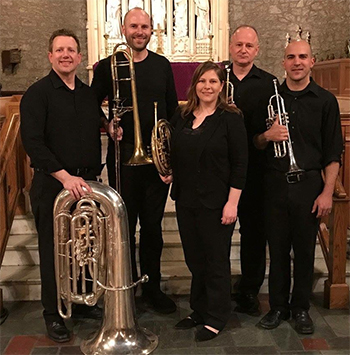by Nicholas Stevens

Composed of faculty members at Youngstown State University’s Dana School of Music, the quintet concluded Music from the Western Reserve’s 35th season by parceling out doses of levity and virtuosity over a wide-ranging and tasteful program. The concert opened with a harmonically tense yet buoyant Overture for Brass by James Stephenson; it became clear early that hornist Stacie Mickens and trombonist Hakeem Bilal make for a great team as the group’s middle voices.
Michael Tilson Thomas’s Street Song, with nods to jazz and Aaron Copland, was frustrating. The composer gives the impression of having repeatedly left the drafting table and returned, as if unsure of how to end the piece. But the quintet handled it admirably, helping listeners navigate their way through the program’s longest work. Each brought warm, dark tones and rhythmic snap to its interconnected episodes.
The opening half of the program ended with a tour de force movement from the third Quintet by Russian brass pioneer Victor Ewald. Tubist Brian Kiser, switching to the larger of his two instruments, sounded authoritative as he played lines that Ewald wrote for himself.
After intermission, the quintet took up an arrangement of Handel’s Royal Fireworks Music, one of the earliest major works for wind ensemble. The arrangements of variations 30 and 18 from Bach’s Goldberg Variations, originally for keyboard, proved more persuasive.
Easily a highlight, the quintet’s performance of Charles Mingus’s Goodbye Pork Pie Hat found trumpet players Christopher Krummel and Nicholas Samson switching to flugelhorns and producing a gorgeous collective sound at the top. Mickens pulled off a spot-on solo near the top of her instrument’s range, and overall the players made Mingus’s piece — a lament for the saxophonist Lester Young — sound incredible. Krummel closed the performance with a hair-raising flourish.
The quintet sounded impeccable in an excerpt from Johann Strauss II’s Blue Danube waltz. Billy Joel’s “Lullabye (Goodnight, My Angel),” a track for piano, voice, and strings, works better for the quintet medium than other pop songs might: brief and melodic, it provided just the right infusion of sentiment before the concert’s lively ending. Camille Saint-Saëns’s Pas redoublé gave Krummel a chance to take his piccolo trumpet for a spin into the stratosphere. The entire group sounded great in this final selection — and visibly had fun doing it.
Published on ClevelandClassical.com April 10, 2018.
Click here for a printable copy of this article


